Empowering Black and African American Breastfeeding Families with @cinnamoms_ Toncé Jackson, EdD, MPH, RDN, CLE
- Which barriers to continued breastfeeding for Black and African American mothers can be altered and to what degree
- How Cinnamoms virtual and in person support groups helped increase rates breastfeeding beyond 6 months
- Why having more IBCLCs and lactation educators from the Cinnamoms community was an important pillar for change
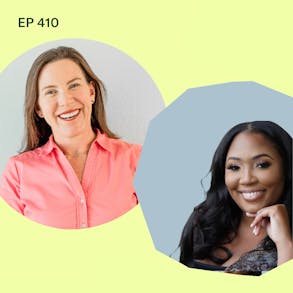
LISTEN TO THIS EPISODE
Episode Description
Breastfeeding is hard. And racial and ethnic disparities don't make breastfeeding any easier for Black and African American mothers. Dr. Toncé Jackson co-founded Cinnamoms to offer support and sisterhood in her WIC agency…but her mission has expanded much further in the parenting space. In this episode Dr. Jackson explains how the Cinnamoms model is increasing the rate of breastfeeding for Black and African American moms at 6 months, and why this is so important as babies prepare to start solid foods.
About the Guest
- Dr. Toncé Jackson is the Sr. Health Equity Manager at PHFE WIC and co-founder of Cinnamoms
- Cinnamoms seeks to empower and support Black and African American breastfeeding families
- The Cinnamoms program has helped increase the rate of breastfeeding at 6 months from 12% to 18% within their cohort
Links from this Episode
- Cinnamoms Website: https://www.cinnamoms.org/
- Cinnamoms Instagram @cinnamoms_
- Racial and Ethnic Disparities in Breastfeeding Initiation - United States, 2019 (CDC): https://www.cdc.gov/mmwr/volumes/70/wr/mm7021a1.htm
- PHFE WIC - the largest local WIC Agency in the US: https://www.phfewic.org/en/home/
- About WIC: How WIC Helps: https://www.fns.usda.gov/wic/about-wic-how-wic-helps
- Sign up for WIC regardless of status: https://signupwic.com/
- Baby-Led Weaning with Katie Ferraro program with the 100 First Foods™ Daily Meal Plan, join here: https://babyledweaning.co/program
- Baby-Led Weaning for Beginners free online workshop with 100 First Foods™ list to all attendees, register here: https://babyledweaning.co/baby-led-weaning-for-beginners
Other Episode Related to this Topic
- Episode 82 - Black Food Matters and Food Justice with Hanna Garth, MPH, PHD
- Episode 98 - Breastfeeding + Scheduling Solid Foods with @milkymamallc Krystal Duhaney, RN, IBCLC
- Episode 220 - Proposed WIC Food Package Changes for Infants with Darlena Birch, MBA, RDN
- Episode 244 - WIC Grocery Haul with TikTok Mom Sunni Rudd @justsunni

Latest Episodes

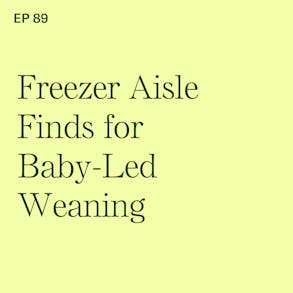
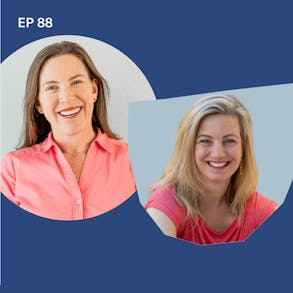
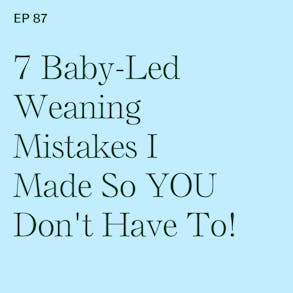
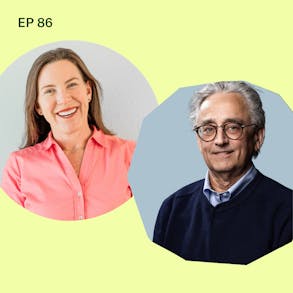

1 (2m 7s):
Know that your breastfeeding journey looks different and you're gonna do the best you can with the resources and support that you have, and that you are capable of extraordinary breastfeeding outcomes. And we are here to support you. We're here with you.
0 (2m 20s):
Hey there. I'm Katie Ferraro, Registered dietitian, college nutrition professor and mom of seven specializing in Baby-Led Weaning. Here on the Baby-Led Weaning with Katie Ferraro Podcast. I help you strip out all of the noise and nonsense about feeding, giving you the confidence and knowledge you need to give your baby a safe start to solid foods using Baby-Led weaning. Because you are in deep parenting and baby space. You have probably heard statistics about breastfeeding. Things like the American Academy of Pediatrics and the World Health Organization recommend exclusive breastfeeding for the first six months of life, but not everybody actually does that.
0 (3m 0s):
In fact, according to the Centers for Disease Control, rates of exclusive breastfeeding at six months as a national average in the US is just under 25%. So, while breastfeeding initiation rates have increased over the past decade, racial and ethnic disparities in breastfeeding exist and persist. Dr. Tonce Jackson is working to reverse that. Her job is to empower black and African American breastfeeding families through her work with CinnaMoms. The organization that she co-founded CinnaMoms is a value added service of the WIC program. So the WIC program is the US Department of Agriculture's special supplemental nutrition program for women, infant and children. And what WIC does is it provides federal grants to states who then provide supplemental foods, healthcare referrals and nutrition education for low income pregnant breastfeeding and non- breastfeeding postpartum women, as well as infants and children up to age five who are found to be at nutritional risk.
0 (3m 57s):
So Dr. Jackson is the Senior Health Equity Manager at PHFE WIC, that's the largest local WIC agency in the US. It serves more than 200,000 clients in Southern California. And as you'll hear in this interview, Dr. Jackson was inspired to create CinnaMoms out of a need to provide breastfeeding and parenting support to black and African-American breastfeeding families in the community that she serves, which now extends beyond WIC. So, I do a lot of speaking in education for state WIC associations around the country on the topics of infant feeding and Baby-Led Weaning. And I am so inspired by Dr. Jackson's work in the breastfeeding space. And because supporting continued breastfeeding in the latter half of infancy is really important.
0 (4m 37s):
Okay? It's not just always a lack of education or understanding about the benefits of continuing breastfeeding, but there are physical and systemic and racial barriers that prevent moms from meeting or achieving their breastfeeding goals. And cinema is working to break through those barriers. So we have a lot of parents and children in our community who are WIC participants as well as many WIC educators and breastfeeding peer counselors who listen to the podcast. And they might not be surprised by this, but it, there's one WIC statistic that always blows my mind. WIC serves 53% of all infants born in the US. Think about that, more than half of all babies in the US receive WIC nutrition and education benefits, and that's not just like, oh, half of them are eligible.
0 (5m 21s):
That's 53% actually participating. And WIC works, data shows that WIC participants have longer pregnancies, they have fewer premature births. There's lower incidences of moderately low and very low birth weight, infant, fewer infant death and a greater likelihood of receiving prenatal care.But when it comes to breastfeeding, between 1996 and 2001, the percentage of WIC mothers who are breastfeeding in the hospital increased by almost 25%. So from 47 to 58%, and the percent of WIC infants who were breastfeeding at six months increased by 61%. So it went from just 13% to almost 21%. So Dr. Jackson and her colleagues at CinnaMoms, they're on a mission to continue that trajectory, but to really, really hone in on breastfeeding rates for black and African American families with an expanded mission to mold the larger landscape, not only to increase breastfeeding rates, but also to enhance the entire parenting journey for the families that they serve.
1 (6m 20s):
Passionate breastfeeding mom, she worked for a local bus driving company here in Los Angeles and she would pump on her brakes, so she would stop and pump, but eventually her supervisor said, because there's like a a camera up top, we can no longer have you pumping on your bus during your breaks. So mom said she would have to go to the nearest jack in the box on her breaks to pump. So we just talk about advocacy and, and moms just just wanting to pump and, and make it happen any way possible. But we also wanna advocate for employers, right, to ensure that like mom had, they have a safe and clean and welcoming space to, to pump and feed their babies. So that was one example that that comes to mind as to why we do this work.
0 (7m 2s):
And can I ask you, is that even legal? Like is that something from a time gone by or stuff like this is still happening today? Does it vary state by state? Like that's such a shocking story.
1 (7m 11s):
Yeah, I'm, I'm hoping It policies have improved, especially for organizations as big as that transportation company. But this was maybe 2016 when this story came up when we were starting our work.
0 (7m 23s):
What was it that caused you to get interested in breastfeeding? Obviously, I mean there's so many millions of stories like that and we all started out as babies that needed nourishment. What led you personally to become interested in breastfeeding education and support and advocacy?
1 (7m 36s):
Yeah, thank you so much for that question. So I've worked for the WIC program for 16 years. I know, and I've always been interested in nutrition and the breastfeeding aspect. So to that line, in 2015, myself and my colleague Carla, we were attending a certified lactation educator course and we just noticed some of the data that was saying that our black women are not breastfeeding and that there's gaps in breastfeeding for our black women. So we just wanted to know what could we do? So we gathered some of our black WIC staff and we said, what can we do to address this and to provide support for our families and to kind of close the gap a little bit. And that was how the pilot really started.
0 (8m 16s):
Also, during that time, Katie, there was a famous rapper, Kendrick Lamar, Grammy Award-winning now, but in 2015, he came out with an album cover of an African American mom, nursing two babies, and we're like, wow, this is synergy because this is what we're talking about raising awareness. So later that year in August for breastfeeding month, we hosted our first support groups and they were at six WIC centers and 50 moms showed up and based on post surveys, they said, we have to continue to gather. So that, I think that's where the passion and support comes from and really the creation of CinnaMoms. When I was reading a little bit about your program, and you've told me about it, and I'm just so fascinated by how much you've done in such a short period of time, which I know you probably think like, oh my gosh, it feels so long.
0 (9m 1s):
But working within WIC and I do a lot of work with WIC in different state WIC associations. I know how long it can take to enact change. So I just wanna say at the top of this interview, I am like your number one fan. I am so impressed by what you and your colleagues are getting done. And I was reading about, you know, gaps in care and you said you noticed gaps in care, but what does that mean? Was it like WIC is very data heavy. Everyone knows that WIC works and the reason why people love WIC is because it works because the data shows all these, you know, improved birth outcomes and you know, attendance at school and all these other, you know, health factors and we have data. What data were you seeing that you were like, whoa, we need to do something here?
1 (9m 37s):
Yeah, so at the time, I'm just looking at some of our data here, it was 38% of our African American infants were fully breastfed, right? But there was this drastic decrease at six months to 12%. So we're like, whoa, what can we do? We know that a WIC, our breastfeeding peer counselor program, our lactation consultants were doing all, all that they could. But we also wanted to know how can we hire more peer counselors, right? Who identified as black or African American at the time, we didn't have any black African American lactation consultants. So how can we diversify the field of, of lactation and bring in more, more professionals? We know that we get support from WIC, but none of the models centered black women and their breastfeeding experiences in particular, I would have to give a shout out to who was at Breast Friends, Brandy Gates in Oakland.
1 (10m 26s):
And they were one of the first WIC agencies that I knew about that actually had support circles specifically for black women and centered on their experiences. So we have a curriculum here at WIC and we had a breastfeeding curriculum then, but we wanted to know how can Cinnamoms be that value add and also center WIC families. Since then, we have seen an increase to about 18% of our black and African American babies breastfeeding still last six months. And I, thanks and kudos to, to the team for that.
0 (10m 56s):
Can you explain real quick what the breastfeeding peer counselor program within WIC is? And was it around when you guys started CinnaMoms?
1 (11m 3s):
Yeah, it was around, and I believe they're actually celebrating 20 years. So it's, it's very exciting that they've been around for quite some time. And our agency has a breastfeeding peer counselor program also, and they are really a peer to peer support program. It's a breastfeeding mom connecting with another breastfeeding mom, following you through pregnancy all the way until baby is six months. So we have had a very successful breastfeeding peer counselor motto. And when CinnaMoms came around in 2015, we really drove that equity and that cultural piece forward and said we need to see a special initiative for our black and African American families. And since then we have increased our African American peer counselor pool.
0 (11m 46s):
Now I wanna talk about those numbers. You said before you started, there was this drastic decrease, 12% of black Infants were being breastfed at six months. Now we know you can start solid foods at six months, but 100% of your baby's nutrition is still coming from infant milk at six months of age. Now you've been able to increase that to 18% who are still breastfeeding at six months. Could you share a little bit about what the barriers are? There's, you know, built environment ones that, like you told for example, with the mom who was working and unable to physically pump. What other things have you been able to remove as far as barriers to help increase that continuation of breastfeeding after the six month mark?
1 (12m 23s):
It's really picking up where our peer counselors kind of leave off, right? We making sure they, they're receiving that wrap around care. They are connected to support circle, support groups where other moms who are kind of on this journey can continue to share their experience and, and say that every baby is different. Every journey is different, but we wanna continue to support you. Thanks to a lot of our WIC grants, we have been able to hire a cinema project specialists who are able to focus on this journey throughout their stages and phases of life. So that is definitely what we've been able to do.Also, and I can talk more about that later, is our lactation consultants, right? They are there, they're available not just as those critical first hours, but they're also available later on too.
0 (14m 34s):
It's funny, I just got off of a parent call with the mom, nine month old, second baby. She's like, I'm not really sure what's going on here. Like, I thought I had this figured out. I did Baby-Led Weaning with my first baby and this baby is totally different. Totally. You know? And she said, I said what she was describing, I was saying, listen, I'd love to help you with solid foods. This is not a solid food problem that you're describing. You need to go see a lactation educator. And she goes, oh my gosh. I thought, well, I did like the first couple weeks. Like I got it all figured out. And I was like, not based on what you're hearing, like these lactations, the support system is here for you throughout infancy, beyond infancy, toddlerhood, as long as you wanna breastfeed. And I think we've just maybe been trained to think, oh, that's what you get when you're in the hospital. And by the way, they kick you out before your milk even comes in. So then you gotta figure out how to go back and find a group.
0 (15m 15s):
But then once you like get it down, I think people think it's done. Could you talk a little bit about extending breastfeeding support beyond six months? Like what do those moms need? Like what sort of myths do you guys hear? Or what, what sort of fallacies do you wanna dispel about breastfeeding after six months?
1 (15m 29s):
Yeah, and like I said, I would love to give also my lactation consultant experts here on the call, but from what I've heard, just sitting in on on our breastfeeding supports are you can continue to do both, right? Like you're here for the comfort, you're here for the nurture. They can still, you know, they're still eating the solid, solid foods, which is great. And they're also, it's okay for them also to want you and to want the nutrition from you, from your breast milk. It's just that support and you all continue can continue until it's best for you and baby. And that's what we've heard. And really, one thing that we've noticed with our CinnaMoms is that a lot of our seasoned moms, they're really anxious and excited to encourage and play cheerleader to, to our moms, like you said, who are four months, five months, six months saying, hmm, maybe I, I don't wanna do this thing anymore.
1 (16m 17s):
They're, they're providing that other aspect on how long they've nursed.
0 (16m 19s):
So can you tell a little bit about the CinnaMoms story and what sort of services do you provide? Does that look the same as at your origin? I think we've talked a little bit offline about how the mission has evolved. Maybe just kind of tell us a little bit about the organization itself.
1 (16m 35s):
With CinnaMoms, we, we have definitely evolved, but what our families get is that social support and a lot of the data and research has set the importance of social support throughout your breastfeeding and parenthood journey. Social support is offered both through virtual and in-person support groups. And we did start off only breastfeeding, right? But we also noticed that our families, they were dealing with real life issues, real life things that we had to address before we even got to the breastfeeding conversation, right? We had to deal with housing and, and food access. So we had to deal with those things. So with that, through that virtual support, we've been able to, to offer that through CinnaMoms.
1 (17m 15s):
Another one is, as I mentioned, we were able to hire Cinnamoms project specialists who are from the community. So they offer both WIC and CinnaMoms wraparound value added service. Also, we were able to make sure that whenever our black and African American moms enroll prenatally, they are immediately connected to a breastfeeding peer counselor, immediately connected to a lactation consultant, immediately connected to a Registered dietitian who shares their same lived experiences and who want them to be successful.
0 (17m 45s):
That's cool. So you're planting the seed essentially even throughout pregnancy, talking about, because I feel like there's so much focus placed on, you know, getting through labor, getting through birth, that's fine. But like that's just the beginning of it, you know? And I think sometimes just, again, not not talking about the problems, but knowing that you have a support system if anything goes wrong or if you have questions, I'm here for you. Because I think traditionally the model is, if you are lucky, you might go through a breastfeeding class at your hospital. But if you're in the WIC program, you've traditionally had better access to breastfeeding support. How does the Cinnamoms model differ from the traditional WIC model? Because if they're in WIC, wouldn't they get access to all that same stuff too? Or am I mistaken?
1 (18m 23s):
No, which is good. So they have their WIC services, which is our core foundation, and they also have Cinnamoms, which is a value add. It's really that centering, it's that cultural aspect. It's that lived experience wing of the support that we noticed was a gap and that we filled, right.
0 (18m 40s):
If you are a Cinnamoms project specialist, are you a WIC employee? Are you certified in lactation or is it more of a coaching role or, or like a, a peer coach?
1 (18m 49s):
All of our WIC staff members, all of our CinnaMoms staff members are WIC, right? Our core service, we're WIC employees first. And that's what make this model work. Because we are WIC employees providing WIC services and then we get to remove our WIC hat and also say, hey, did you know about a doula? Did you know about, you know, the things that's going on with maternal health as it pertains to black women? So we've been able to do both. And that's only through the support of our Executive Director, Kiran and also through grant funding that we're able to do that.
0 (19m 17s):
And you have a physical space too, don't you?
1 (19m 21s):
Yay. Thank you for bringing that up. Yes. CinnaMoms Crenshaw. Yes. So in June, June of last year, we were able to convert 1500 square feet of an existing WIC center. And CinnaMoms Crenshaw is our first location. A lot of our moms, they say we love virtual, but we need to get back to connection. So CinnaMoms Crenshaw is this luxe and modern space where our families are able to rest first and foremost, right? They're able to find some respite. They're also able to connect and prepare for their pregnancy, which is that nesting stage. They're also able to schedule a play date, right? And then have the, the babies be watched by our, you know, by our CinnaMoms team while they're able to relax and, and read and then of course receive in-person lactation support.
1 (20m 4s):
So If, you're in the LA area. CinnaMoms Crenshaw.
0 (20m 6s):
I'm so impressed by your model like and how you even just started an organization within WIC. Like government programs are a bear of their own WIC. I was talking about the successful outcomes. Everyone loves WIC, but it's still a bureaucracy. Like how did that process evolve? Who had the original idea, you know, what sort of grants did you have to write? How long did this whole thing take? Because having, you know, such a unique organization within WIC is so unusual.
1 (20m 33s):
Yeah, no. At our WIC agency we have 185,000 families that we serve every month. And it just so happened that about 7,000 of those to identify as black or African American. So we have the population, we have the niche to be able to make this model work, but we also know that it can work even if you're serving five to 10 WIC families who identify as black or African American. And thanks to our grant, you know, lemme go to partners. Partners from LA County, Department of Public Health, Soul Food, for your baby, black infant Health Roles BIH in in Detroit, right? Black Mamas Matter in Atlanta. Our other WIC agencies, California State WIC, California WIC Association, National WIC Association, and our, our partners, our health plan partners have been able to believe in this model, have been able to provide us with funding so that we can be evidence informed that this model works and that black women know that black women have said that this model works for them to advance maternal health.
1 (21m 32s):
So with this grant funding, we've been able to build staff capacity. We know our staff can do WIC, they do WIC very well. And with additional grant funding, we're able to serve both WIC and non WIC families, which has been so, so helpful, right? Because during the pandemic when we were able to delete the geographical divide, we had families from Los Angeles connecting with families from San Diego, connecting with families from Orange County. So thanks to grant funding from 2016 when we received our first funds from Packer Foundation to 2021, we received the USDA grant for 450,000. We have been able to advance that mission.
0 (22m 10s):
Is it still the case that if you're not enrolled in WIC, you can participate in the breastfeeding support groups
1 (22m 17s):
For us? Yes, absolutely. For CinnaMoms, our staff are able to support you and serve you if you do not receive WIC. And that's through that started off with a grant funding from Kaiser Permanente. We wanted to oscillate Kaiser Permanente members with WIC members and just share stories and, and engage and increase breastfeeding awareness.
0 (22m 36s):
So for our listeners, who are pregnant and considering breastfeeding, maybe they had their baby and they're struggling or they're thriving with breastfeeding, how can they get connected with your mission and benefit from CinnaMoms services?
1 (22m 47s):
One mom said every time I join CinnaMoms, it's, it's a beautiful and uplifting experience. It feels like family, right? So whether you, you are on your, on your journey. CinnaMoms has been known as a place like a cousin's house, right? It's like going to a cousin's house. So we just wanna say welcome home So, If you are a WIC family. Text us, you can email us. Our project specialists are waiting for you. If you're not a part of the WIC Village, follow us on social media, IG. We're pretty active on there. That's CinnaMoms_, we have a face private Facebook group where you can get your questions answered.
1 (23m 21s):
We have a robust website and if you're ever in LA, visit us at CinnaMoms Crenshaw.
0 (24m 6s):
Don't say, what's one piece of advice that you can give for a new mom who maybe does not feel so supported right now in her breastfeeding experience thus far?
1 (24m 17s):
It's connection, connection, connection. Please get connected to your village of support and we are here for you. There are a lot of free resources that are available, whether it's a WIC peer counselor, CinnaMoms breastfeed, La Lache Lee. There are so many accessible resources. Another theme that constantly comes up from my staff, a piece of advice is know that your breastfeeding journey looks different and you're gonna do the best you can with the resources and and support that you have. That's Jeannie Baker. And that you are capable of extraordinary breastfeeding outcomes and we are here to support you. We're here with you.
0 (24m 48s):
What's your goal? How far do you want to go with this? Do you wanna see CinnaMoms in every WIC agency around the country? Is that going to 25% continuing breastfeeding at six months? Like what's your long-term goal with this organization?
1 (25m 3s):
So that's it. We want to grow CinnaMoms. We know that it works. So we wanna CinnaMoms San Diego, CinnaMoms St. Louis, look, we are, we are ready to expand CinnaMoms so that others can benefit from this village. This really this village of support. This totally possible, totally doable. So If, you're WIC agency. We have a model that that works
0 (25m 24s):
Well. I saw you guys speaking at the National WIC Association meeting last year here in San Diego and when you were done, like people are like rushing the stage to talk to you. And I'm sure it's like, I wanna do the same model, I wanna do the same model. If someone is listening, we have a lot of WIC educators, WIC staff who listened to the podcast. If they're interested in that model, who should they connect with in order to discover doing this? You know, if this doing this is possible in their agency,
1 (25m 56s):
Please just email us at Cinnamoms@phfewic.org., bestcinnamoms@phfewic.org. Myself, our CinnaMoms coordinator, I CinnaMoms, strategic engagement strategic coordinator, we're all there to answer your questions and to get you on this journey to have CinnaMoms at at your local agency.
0 (26m 7s):
Sometimes when people hear stuff about PHFE WIC, they're like, I mean you guys are the golden child of the WIC world, right? Like when we look at research, you mean so much of the what's happening is coming outta PHFE WIC and I've heard from other agency members, yeah they can do that 'cause they're PHFE WIC, like they have all this money, they have all this support. What would you say to a smaller agency that maybe does just have eight or 10 moms who identify as black or African American breastfeeding families? Like what can they do? Can they really do this without, you have incredible grant writers that are helping you get Kaiser grants and things like that's not real life for all agencies. What can they do?
1 (26m 42s):
That's a great question and a part of that CinnaMoms motto, the CinnaMoms Ambassador brand is there are several ways you can go if you have the funding, if you have the capacity, perfect, it's CinnaMoms in a box and it's ready for you. However, if you do not have the capacity because of this virtual environment, we have the team, we have the team to be able to reach out to those families to make sure that they're attending our, our virtual support. So especially with, you know, with California WIC, we share the same text messaging system so we can do that. We're, you know, we're here. So regardless of whether you have eight or whether you have 8,000, this motto is flexible to be able to support you where you are.
0 (27m 20s):
I think the WIC text messaging program is so amazing and when I see other agencies that like can't, you know, IRS can't answer the phone, I'm like, you know that in WIC, like they are texting all of the participants. It's so wonderful. I take a lot of dietetic interns who come from the WIC internships as well. And we're doing a lot of work at the state level helping to modernize the infant nutrition and feeding curriculum. And I'm just so inspired by what WIC has done with modernizing the breastfeeding curriculum. I think it's really inspiring, but we need to keep going, right? Because the next phase of starting solid foods, there's so much data out there that babies can eat so many more foods than we're giving them credit for. And I really just love collaborating and working with WIC because WIC educators are problem solvers. And I, I just absolutely love that. So thank you for all the work that you do.
0 (28m 3s):
Thank you for taking the time to come on and share about CinnaMoms here on the podcast. And anything you wanna add in closing to kind of keep that mom who's on the verge of like, Ooh, my baby's six months old so I'm gonna quit breastfeeding. Like what do you say to them to keep them sticking with it?
1 (28m 16s):
You have this and you have, you don't see them right now, but you have a village of support, right? We are here for you. And a lot of times when we say empower, it's really us just holding up the mirror so you can see how powerful and impactful you are. So you're not alone. We're here. You have a village of support.
0 (28m 35s):
That was Dr. Toncé Jackson, Senior Health Equity Manager at PHFE, WIC and Co-founder of CinnaMoms. If you are interested in learning more about Cinnamoms and the resources they provide and maybe signing up yourself to attend a virtual breastfeeding support or parenting support group, they are online at cinnamoms.org on Instagram. They're at Cinnamoms under and if you are interested as a eligible pregnant postpartum or nursing mom, or if you have eligible children up to age five, you can sign up for WIC to receive nutrition and education regardless of status at sign up WIC dot com I'll put a link to some of the research that Dr. Toncé Jackson cited, as well as the cinnamoms resources, some information about adding and signing up to WIC.
0 (29m 20s):
All on the show notes page for this episode, which you can find at BLW podcast.com/410. And a special thanks to our partners at AirWave Media. If you like podcasts that feature food and science and using your brain, check out some of the podcasts from AirWave. We're online at BLW podcast.com. Thank you so much for listening. I'll see you next time.

The Program Baby-Led Weaning with Katie Ferraro
A step-by-step digital program for starting solid foods safely and navigating the original 100 FIRST FOODS™ meal plan with baby-led weaning.
 EXPERT-LED, PROVEN APPROACH TO EATING REAL FOOD
EXPERT-LED, PROVEN APPROACH TO EATING REAL FOOD CONCISE VIDEO TRAININGS TO MASTER BABY-LED WEANING
CONCISE VIDEO TRAININGS TO MASTER BABY-LED WEANING 100 FIRST FOODS DAILY MEAL PLAN WITH FOOD PREP VIDEOS
100 FIRST FOODS DAILY MEAL PLAN WITH FOOD PREP VIDEOS
Baby-Led Weaning for Beginners Free Workshop
Is your baby ready to start solid foods, but you’re not sure where to start? Get ready to give your baby a solid foundation to a lifetime of loving real food…even if you’re feeling overwhelmed or confused about this next stage of infant feeding.
Get baby-led weaning recipes and tips delivered to your email inbox.

